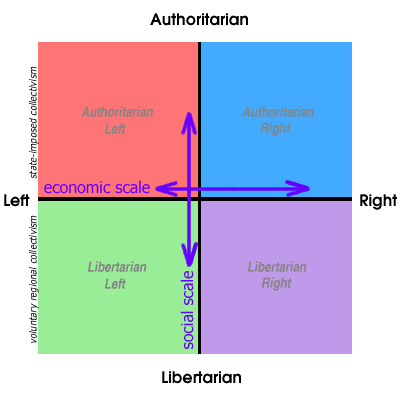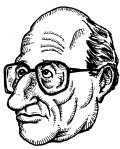About the Political Compass
The starting point of the (original) Political Compass was in 2001, when we recognised the inadequacies of the standard political measure:

It’s certainly fine for discussing economics but to this day is still widely — and wrongly — used to describe social attitudes. France’s National Front, for example, is popularly described as “far right”, yet its economic policies have sometimes been to the left of even the French Socialist Party. The party’s real extremism is in its social attitudes. That’s why we added a social scale.

Nevertheless, the more nationalistic and authoritarian a party or individual is, the more ‘right-wing’ they’re still labelled. This, of course, is absurd. Taken to its logical conclusion, it means that the further left a country sits, the more socially liberal its attitudes are. on that basis, North Korea must be a shining model of human rights and social freedoms!
Conversely, a country may be very right wing (ie libertarian) in its economics, and be authoritarian at the same time. Singapore is a perfect example.
The Index of Economic Freedom produced by the Wall Street Journal and the conservative Heritage Foundation, hails Singapore as the economically freest nation on Earth in 2021. On the social scale, however, it’s a very different story. Human Rights Watch details its reasons for finding Singapore a deeply authoritarian state.
Take a look at a few contrasting nations on this chart:
Uruguay is currently rated the world’s 44 th most free economy, and a leading Latin American light in social freedoms — from gay and lesbian rights to legalisation of cannabis. Switzerland also has a high rating as a libertarian economy, while at the same time providing a wide range of social welfare programmes, in common with the Nordic states and a number of other western countries.With the exception of its Hong Kong region, China maintains strong economic controls, though fewer than those associated with a more orthodox ruling ‘Communist’ party. In recent years China has shifted closer to the totally repressive social climate of North Korea, where the economy also is under the absolute control of the state. Saudi Arabia has veered futher towards a libertarian economy in recent times, but with no real relaxation of its sweeping authoritarian powers.
Join 27 caricatures of your most loved and loathed political figures in a personalised colour certificate that you can download and print in moments.
It’s beautifully designed by political cartoonist Malcolm Evans and serves as a permanent record of your position on the Compass, and the political company you keep.
To claim your certificate, use the link above. You will be invited to supply your name, to be printed on the certificate. The certificate will download to your browser as a pdf, which you can save and print at your leisure. You can save the link and re-download it at any time.
Previously we charged £5.00 for issuing the certificate but this became uneconomic in the light of rising costs of our payments provider and bank. We’re now giving it away. If you have paid for a certificate in the past, we thank you for your support.
Claim your (free) Political Compass Certificate
A PERSONALISED POLITICAL COMPASS CERTIFICATE SHOWING YOUR OWN POSITION IS AVAILABLE ONLINE

Malcolm Evans
Our caricatures are drawn by New Zealand cartoonist Malcolm Evans.
If you’d like a caricature of yourself — or someone else — just send:
- 2 - 3 photos of yourself, with or without a friend
- any other information you’d like included
- a payment of NZ$100 via PayPal
to [email protected]. Remember to include your mailing address. If you want your caricature placed in a Political Compass quadrant, indicate which one. Otherwise Malcolm can draw you doing whatever you’d like: graduating, gardening, grilling — or whatever’s uniquely you. You might like a sporting or wedding cartoon, either for yourself or someone else.
Malcolm’s cartoons make great gifts.
Malcolm is not connected financially to The Political Compass. If you wish to donate to The Political Compass, use the donation form below.
How You Can Help Us
A great deal of effort lies behind the development of The Political Compass, and the realisation of it in practical form. It has occasionally come to our attention that other sites have tried to exploit our work by copying it, adopting our name, or linking to us in a dishonest fashion.
If you should come across any such sites, please let us know so that we can take appropriate action.
A few critics believe that we should blow with prevailing political winds and narrow the actual parameters. Please see our FAQ 22.
We have consistently resisted many approaches for banner and pop-up ads or permanent corporate sponsorship because of the potential compromises that such arrangements almost inevitably entail. However if you like The Political Compass enough to help us, please leave a tip below:
Make a small donation to The Political Compass
If you like The Political Compass and wish to support our work, you can make a small donation using the form below.
… or Paypal
Thanks from the Political Compass team.
US Presidential Election 2020
UK Election 2019
ICONOCHASMS: How well do you know your political icons?
New material is regularly added to The Political Compass — please keep coming back!

